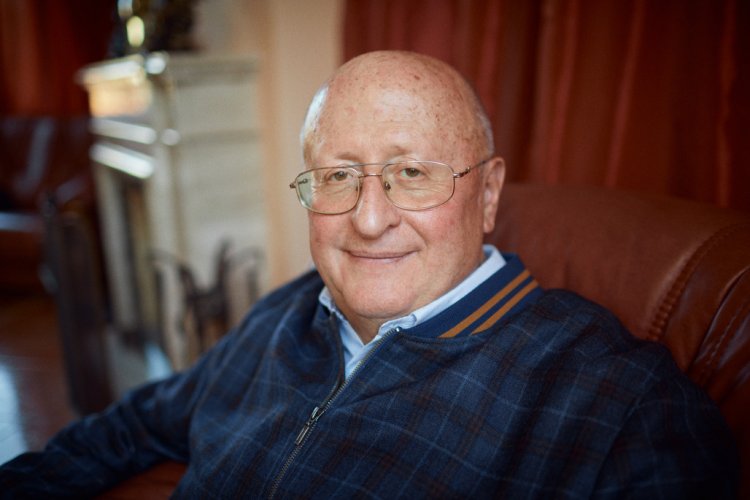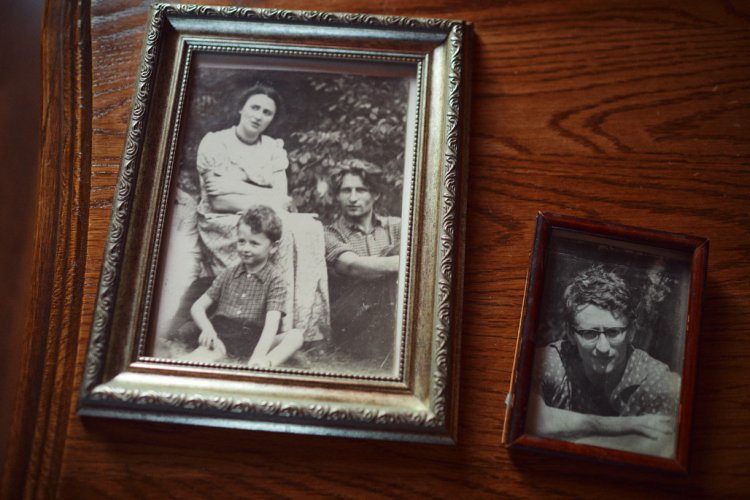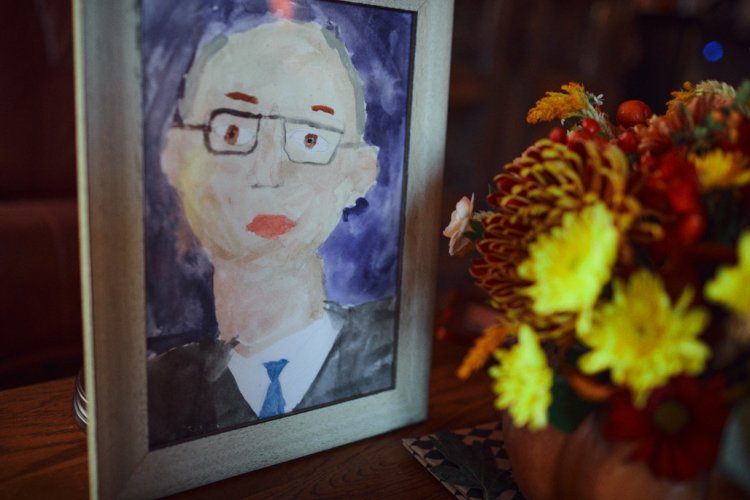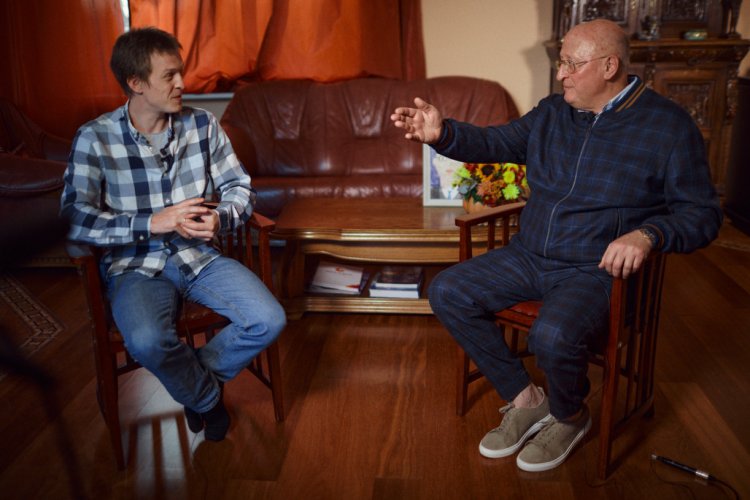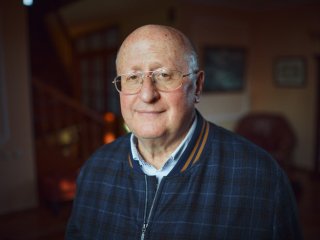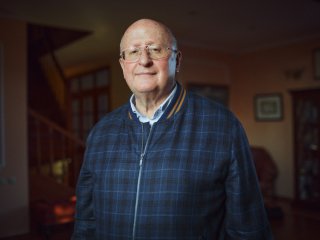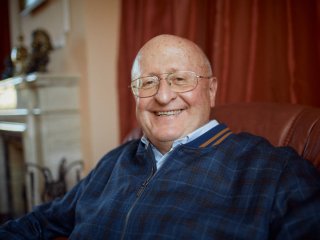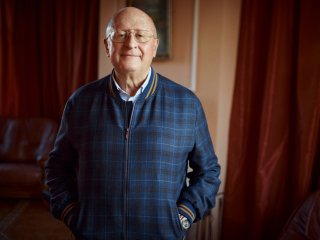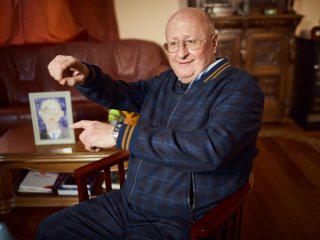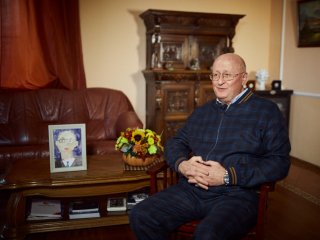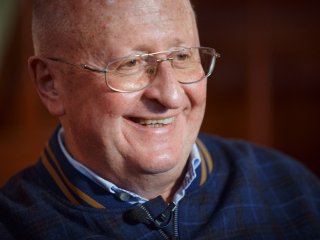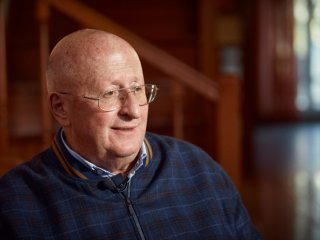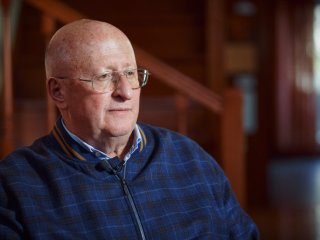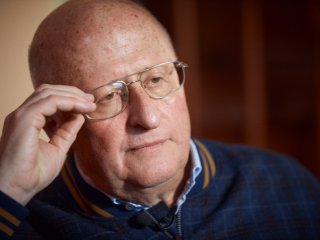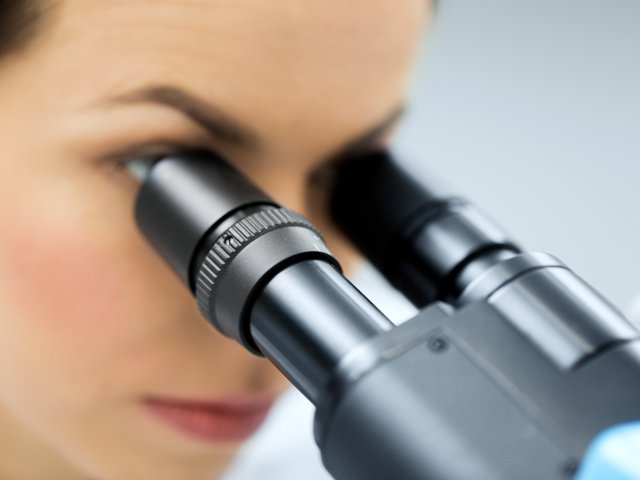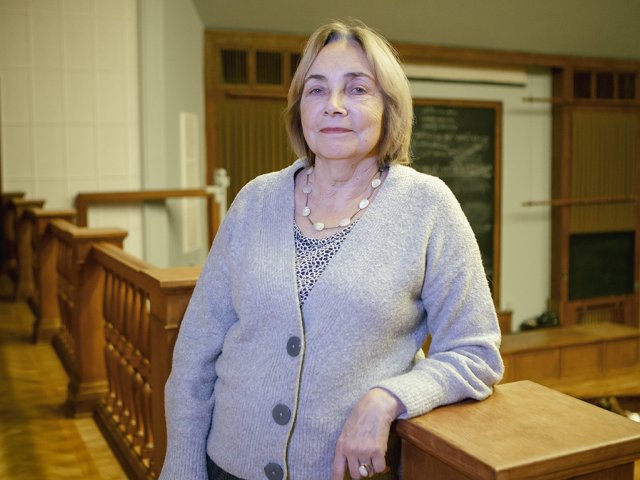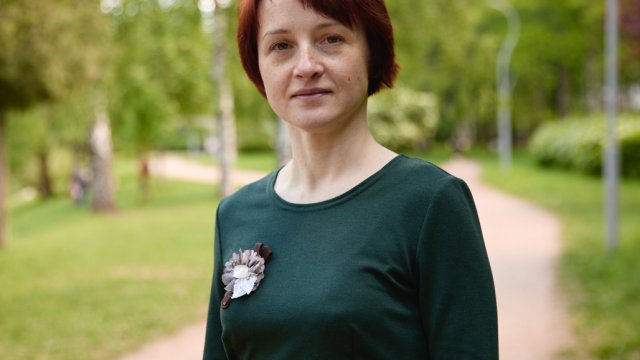The word of 2021 in Russia was Sputnik. The Pushkin State Russian Language Institute noted that it was used nine times more often. The Oxford Dictionary chose a more generic Vax as the Word of the Year, which can be understood as vaccination.
In an interview, Alexander Leonidovich Gintsburg, the head of the Gamaleya Research Institute of Epidemiology and Microbiology, tells how his scientific path developed, why it is necessary to get vaccinated and what prejudices against the vaccine should be forgotten to protect yourself and your loved ones from the disease.
Alexander Leonidovich Gintsburg
Photo: Nikolay Malakhin, Scientific Russia
– How did you decide to become a biologist? Why, when it came time to choose a future profession, you decided to enroll in the Faculty of Biology and Soil Science of Moscow State University?
– When it comes to choosing a profession, parents play a significant role in the fate of many people. I am no exception. Both mom and dad helped me with the choice, although they motivated their decisions differently.
My father worked as the head of the car handling department at NAMI. For decades, he created all kinds of cars, taught NAMI students and employees. It was he who developed the first domestic steering amplifiers and many other things useful for drivers. He understood that I have no heart for technical sciences, and it’s worth choosing from those professions where you don’t need to be able to draw well or have a three-dimensional imagination to depict any object in two- or three-dimensional space.
Mom was engaged in the creation of bridges. She was a professional designer of structures that still serve well today. Listening to dad, she seriously helped me choose from a variety of non-technical sciences. Namely, she subscribed me to the pamphlet of the Znanie (Knowledge) Society. I don’t know if they exist now, but when I was 13-15 years old, this organization worked very well. My mother put pamphlets on my desk on completely different topics: physics, mathematics, biology, medicine.
I still remember one of the pamphlets: it was written by Academician Andrey Nikolayevich Belozersky, the future Vice-President of the USSR Academy of Sciences, who with his student Alexander Sergeevich Spirin actually created molecular biology in the country. On ten or fifteen pages of the brochure, he outlined really well everything related to the structure, functioning of nucleic acids, and protein synthesis. It was so good that everything seemed logical and understandable to me, even though was completely uninitiated at that time. I wanted to learn more, and this was the first impetus for my love for molecular biology and for choosing a profession to which I have devoted 50 years. At school, this interest and knowledge helped me to become head and shoulders above others in the field of biology, and I began to educate myself.
And then the choice was clear: if you read Belozersky, you need to enroll in the Faculty of Biology, where Andrey Nikolaevich at that time had the Department of Plant Biochemistry and the Department of Virology at the stage of creation. I managed to get to the Department of Virology, where a brilliant team of molecular virologists and molecular oncologists was assembled.
– Was it hard to enroll?
– Back then it seemed difficult, I had to score fifteen out of fifteen points. The competition was about 13-15 people per place. Both at that time and now MSU is a very prestigious university that provides excellent education, there is no shortage of students there.
What I have managed to achieve in life, I owe a lot to the Faculty of Biology and the department where I happened to study. And also, to the internship at the biological department of the Kurchatov Institute, where I then continued my work. Its supervisor was Roman Beniaminovich Hesin-Lurie: for seven years he taught everyone who came to him not only to work but also to think. The main thesis of Roman Beniaminovich was: “You got to me. And my fool must be the smartest fool in the world.”
Photo: Nikolay Malakhin, Scientific Russia
– You’ve been doing biology for 50 years. Have you ever thought that it would be worth it doing something else?
– I haven’t, for the simple reason that I was always immersed in overcoming new challenges. At first, my teachers posed them for me: at the Faculty of Biology at Moscow State University, we were kept plenty busy, and the learning process was extremely exciting and diverse. Then the tasks were set at the Kurchatov Institute. Then I got to the Gamaleya Research Institute of Epidemiology and Microbiology. The history of this institute is full of such scientific achievements and events that it is necessary to constantly be in shape, follow trends to match its level. Therefore, I had absolutely no reason and desire to think about how to achieve something in another area.
I have always had a desire to meet the level of the institute, and especially the level of the Academic Council. I have been working as the director of the Gamaleya Institute for almost 25 years. Believe me, the most responsible thing is to take the podium in front of brilliant scientists every month and keep this audience in scientific suspense. I must form the agenda, select speakers, and lead the Academic Council. And for this, you need to be in excellent scientific shape. All this is not to mention the overall management of the institute and the control of numerous areas that the institute developed both before the pandemic and during this difficult period.
It takes 24 hours a day, so there is no reason or time to wonder if I could be useful elsewhere. Now I can’t imagine myself in another part of the scientific space.
– Is it difficult to keep a balance between a research scientist and an organizational scientist?
– It is, but it is essential in order to have influence and authority in the scientific community. It is necessary to meet the scientific level of the people you interact with. We have many professionals who not only know this area well but in fact created it. This is their native sphere, and I “invade” some issues from the outside: for you to be allowed into this circle and become respected, you need to know the subject no worse than the classics. Believe me, it’s not easy.
On the other hand, many young scientists are emerging. I consider this one of my achievements as an organizer. Dozens of scientists from 28 to 40 years old gather at the Academic Council and this is sincerely pleasing. These are people with a good university background, graduates of leading medical and chemical universities. There are physicists and mathematicians. Such an alloy generates fundamentally new and interesting ideas.
As for administration: life itself forces me to devote a lot of time to this, but I don’t regret it at all. By the beginning of the pandemic, the institute was ready to solve the most complex scientific and organizational problems. Therefore, we have achieved results at the level of global pharmaceutical giants, having orders of magnitude smaller financial capabilities. Our current products are competitive not only domestically, but also on the world market.
– Since the beginning of the pandemic, and especially after the start of mass vaccination, you have become an extremely public person. Comments, participation in interviews, in the preparation of news and articles – does this distract from work?
– At first, it was very distracting. But later these tasks moved to the reflex level: probably this is a defensive reaction to free up the brain for more creative things. When I managed to come to such a state, all this became not such a heavy burdensome occupation.
We meet with you on a day off. If we hadn’t recorded the interview, I would have read some reviews, discussed a scientific problem with my wife. But we are talking so that you can convey to the general public the need for vaccination. I hope this will bring benefits: people will overcome fears and prejudices about the vaccine and will be able to protect themselves and their loved ones.
The complete safety and high efficiency of Sputnik V have been proven – do not consider this an advertisement – this is a call to our citizens to protect themselves in a difficult time for everyone. This is an opportunity to reduce the number of deaths and return to a full and normal life.
– In July, the Presidium of the Russian Academy of Sciences set the bar – 60% vaccinated by autumn. Unfortunately, this task was not completed. Now research suggests that about 60% of people who refuse to be vaccinated in the near future, refer to the fact that they are advised against it by doctors. How did this situation develop, and is it possible to get out of it?
– This situation did not develop in one day. I remember the times when not only adults and teenagers were called for vaccination. Such propaganda, in the best sense of the word, began from a young age. There were cartoons where “good” animals, such as bunnies, went to get vaccinated, and an irresponsible hippo refused, after which something bad happened to him. In the image of the child, the idea was formed that it was necessary to be vaccinated as calmly and regularly as washing hands, brushing teeth, saying hello when you enter the room, and goodbye when you leave. This propaganda is necessary at all levels, but in the last 20-30 years it has disappeared. Perhaps because it does not bring direct income. Now we have felt the absence of such an information campaign in the form of vaccine skepticism.
This gap is noticeable both here and in Western countries. The so-called golden billion, which largely determines the lifestyle and standards to which the world’s population aspires, probably suggested that improving social and living conditions can solve all medical problems. As the ecology of pathogenic microorganisms now shows, this was a mistake. Despite the highest standards of living, even having, for example, your own island with full infrastructure, no one can guarantee that a person will not get sick. 100% guarantee can only be given by a good vaccine, which was introduced on time.
We, each from our position, missed this problem. Such concepts should be introduced not when a person is 60 years old, but from the age of five or six, when a child starts watching cartoons. The benefit will be for everyone, especially if you remember about the effect delayed by decades.
– Perhaps, this is also the question of popularization of science in general from childhood, which was widespread during the Soviet Union.
– Yes, this work has weakened. Maybe we, scientists, are partly to blame for treating this as a secondary task. Perhaps this interview will close such gaps in some hundredth of a percent. It is necessary to disseminate the experience of the highest scientific fields among the population in our country and around the world.
– There are several popular prejudices about vaccines. One of them says that vaccines either do not protect or weakly protect against new variants. Is it so? Should we already think about creating a new vaccine, or is the existing one still enough to fight the virus?
– This issue is now being discussed not only in society but also in scientific circles. Since mid-May, the Delta variant has been spreading all over the world. The mutations that appeared in it not only changed it antigenically but also changed the interaction of the variant with our cells. And the antigenic changes are especially noticeable compared to the Wuhan strain, based on which all vaccines, including Sputnik V, were made.
At the same time, experiments and epidemiological observations in our institute and other countries where Sputnik V is used show that the vaccine protects against the Delta variant by 83-90%. And the possibility of a severe course of the disease and a fatal outcome in the case of the disease is virtually completely excluded, differently from vaccines that are widely used abroad.
The antigen used in Sputnik V produces a very wide range of antibodies that neutralize the virus. In response to other vaccines, many neutralizing antibodies are also formed, but their spectrum is much narrower due to the way the S-protein, which is the main antigen and immunogen, is constructed. Therefore, the effectiveness of other vaccines against the Delta variant is about 50%, that is, it is much inferior to Sputnik V.
Now the Sputnik Lite vaccine has been released, which the Ministry of Health recommends for revaccination. Studies show that people who first received Sputnik V and then were revaccinated with the Lite vaccine are completely protected from the Delta variant. With the same result, Lite can be used for revaccination after using other vaccines.
Today there is no reason to talk about replacing the vaccine, although the Gamaleya center, like other manufacturers, is working out technologies that will allow replacing it if a radically new variant appears. We are ready for such a turn of events, although, thank God, such circumstances have not yet come.
– So, Plan B is already written on paper?
– Not only written but also worked out experimentally. Now it is necessary to determine a set of studies of a new vaccine, which will allow proving as quickly as possible that the vaccine is safe and effective to introduce the drug into civilian circulation. Scientists have this knowledge, now they need to be coordinated with regulatory authorities, and then Plan B will be fully ready. I hope the Ministry of Health understands this, and we will complete the work soon.
– The media publishes rather vague recommendations regarding boosters. In particular, people are advised to take booster shots every six months. But after all, organisms are different, and the level of antibodies is preserved in different ways. When is it still worth revaccinating?
– We have clearly identified the level of antibodies that reliably protects a person from COVID-19. To do this, we analyzed about four thousand serums of vaccinated and recovered people.
A person is completely protected from the Delta variant at an antibody level of 300 BAU (Binding Antibody Units: an international conventional unit showing the number of antibodies. The new measurement standard is recognized by the World Health Organization, – ed.). If the level of antibodies in the body is below 300 BAU, a person needs to be revaccinated with Sputnik Lite. But at the same time, if a person has more than 500 BAU and is revaccinated, then nothing bad will happen: our immune system, figuratively speaking, has not only a gas pedal but also a brake pedal. The body will not produce prohibitively high levels of antibodies that will not be used. Therefore, booster shots, even with high antibody titers, will not harm in any way.
Usually, the level of antibodies in the blood of the average person is kept at a high level for five to seven months. We currently do not have the organizational ability to constantly check each person for the level of antibodies. Therefore, the Ministry of Health recommends revaccination every six months, which I fully support. This will not harm anyone, but with a decrease in the level of antibodies, revaccination will raise it to a level that is guaranteed to protect the body when encountering COVID-19.
Photo: Nikolay Malakhin, Scientific Russia
– Another popular subject today is Sputnik V and pregnant women. Many are skeptical that pregnant women and nursing mothers are allowed to be vaccinated. It turns out that they cannot take most of the basic drugs, but the vaccine can be administered. How to treat it?
– Russia is not the first country to allow vaccination of pregnant and lactating women. Unfortunately, we are far behind here.
A woman should get vaccinated before the couple plans to have a child. If this did not happen, then she can get vaccinated during pregnancy. Now scientists all over the world concluded that one can get vaccinated at any time. At the Kulakov National Medical Research Center for Obstetrics, Gynecology and Perinatology, this was proved by a complex of studies.
This work was carried out by a group of obstetrician-gynecologist Leyla Vladimirovna Adamyan: they compared the organisms of women who received the vaccine and those who were not vaccinated. It turned out that Sputnik V does not affect the genetic apparatus.
It should be understood that up to 6 months from the moment of birth, the child is protected from external pathogenic microorganisms, including the causative agent of COVID-19, only by antibodies that they receive from the mother’s milk. To transmit these antibodies, a woman must be vaccinated, this is the only way she can protect the baby. Otherwise, the child is at high risk. Statistics show that the Delta variant does not spare either adults, the elderly, or newborns. Therefore, if the mother has the opportunity to get vaccinated, she should do it: it will not do any harm, but it will protect the baby. The only alternative is complete isolation.
At the same time, in men who have suffered COVID-19, sperm motility drops sharply, and for a long period. Accordingly, those who have been ill have a much lower chance of conceiving a child.
– Another category of people who are at risk is the elderly. Are you vaccinated?
– Yes, since a long time ago.
– Would you recommend other people over 60 to get vaccinated? Should they be afraid of complications?
– I recommend it. There is absolutely nothing to be afraid of.
– During your scientific practice, have there been challenges as strong as the need to create a vaccine against COVID-19 as soon as possible?
– The first-ever vaccine was created against smallpox by the English physician Edward Jenner in 1796. More than two centuries have passed since that moment and, perhaps, there has never been such a challenge for the creators of vaccines as the situation we are facing now. This is because almost all vaccines were created during the interepidemic period – when the threat subsided, and the drugs were prepared for the future.
The coronavirus vaccine had to be created amid a pandemic, and many of the principles that have been formed over more than 200 years had to be changed on the go. We had to develop new scientific approaches and technologies that allow us to speed up the process. For example, the BCG vaccine against tuberculosis, which is also produced by our institute, took about 25 years to create, it was possible to afford it. Now we had to release the drug in 5 months. It was necessary not only to create accelerated drug development technologies but also to solve the tasks of transferring the created vaccine from the laboratory to civil circulation. Now, these problems have been solved, so it is doubly disappointing that the population, not only of Russia but of the world, does not use the scientific and organizational results obtained.
Perhaps, due to several circumstances, we, scientists, do not speak widely and actively enough. Perhaps you, the journalists, are not adapting us enough to this. The word propaganda is often used in a negative sense, but I believe that this is the most accessible way to bring elementary truths to the masses. It takes perseverance to bring important information to people. We are not doing enough in this regard. Perhaps not enough money is allocated for this, because it does not bring direct income. But we must be fully prepared in case humanity is again faced with the same blow, close to a knockout.
– What is the current situation with the release of the Sputnik V vaccine? Does the country have enough drug and production capacity?
– At the very beginning there were problems of technology transfer from the laboratory to production. I am proud of the experimental production of the Institute, as well as for 4 pharmaceutical enterprises: Generium, BIOCAD, Biopharm, and R-pharm, I can say that we have coped with this task. Now any amount of vaccine can be released within one to two weeks. This is not to mention the stocks in warehouses that need to be implemented to create collective immunity.
In part, the problems with exports and access to foreign markets are due to the fact that Western professionals understand that the Russian pharmaceutical industry can compete on an equal footing with the most expensive, voluminous, technologically advanced big pharma of the West, which was not the case a year ago.
The current situation has brought us to a new level not only of scientific capabilities but also organizational and organizational-financial. Thanks to the country’s top leadership, we have developed a strong fusion of science, production workers, and big business, including banking capital. All this works in a single complex for solving scientific and organizational tasks.
– Today, measures are being introduced to create herd immunity: restrictions on work access, visits to certain places, which is sometimes called mandatory vaccination. How do you feel about that?
– Vaccination can be called mandatory only when it is included in the national vaccination calendar.
As for restrictive measures: neither Moscow nor Russia is ahead of the whole planet in this regard. Harsh measures were introduced before us in Israel, Portugal, and other Western European countries.
The effectiveness of the measures introduced is easy to assess. 2-3 months ago, QR codes were introduced in Moscow, and they began to strictly differentiate the rights of vaccinated and unvaccinated, then people actively went to get vaccinated. After the codes were discontinued, the vaccination rate dropped tenfold. Had that high level continued, today at least the entire Moscow region would have lived peacefully: visiting each other, going to cafes, football and hockey matches, theaters, and cinemas. We would forget that the pandemic continues.
Now we are slowly and hesitantly returning to the same system. Strict differentiation measures are needed between those who have been vaccinated and those who have not. If for some reason you did not want to get vaccinated, then you are free to do whatever you want, but only at home and on the way to the nearest grocery store. At mass events, you should not be the source of the spread of the virus and risk the health of others. It is necessary to defend the interests not of those people who oppose vaccination, but of those who consciously want to protect themselves and the society they live in.
– But even when herd immunity is reached, the coronavirus will not go anywhere. Will we have to live with it?
– Yes, that’s why I hope that sooner or later the coronavirus vaccine will be included in the national vaccination calendar. We calmly vaccinate children from the age of zero to 12-14 years. This calendar also includes a flu shot, no one is outraged by this.
– Is a combined flu and coronavirus vaccine possible?
– Yes, we are working on it. I will not say that such a vaccine will appear tomorrow or the day after tomorrow, but I do not rule out that we will start clinical trials in the second half of next year.
– What contraindications does Sputnik V have, and is it possible to vaccinate people with oncologic diseases?
– All contraindications that exist for vaccines included in the vaccination calendar also apply to Sputnik V. Namely, it is impossible to vaccinate a person in the acute stage of any inflammatory or infectious disease.
It is not necessary to vaccinate cancer patients who are directly undergoing chemotherapy. Vaccination will not harm them in terms of the underlying disease, but there will be no effect from vaccination because all chemotherapy drugs are cytostatics, that is, they suppress the reproduction of tumor cells. For antibodies to be developed and a full-fledged immunity to be formed because of vaccination, the cells of the immune system must also multiply. Against the background of cytostatics, they will not be able to do this, so it makes no sense to vaccinate a person who is undergoing chemotherapy.
But in the intervals between chemo, if at least a two-month break is possible, it makes sense for an oncology patient to be vaccinated. Vaccination will not affect the development of cancer.
– Is it possible to predict when the pandemic will end?
– Yes, this answer is in the textbook on epidemiology. The pandemic of infection transmitted by airborne droplets will end when 70% of people are vaccinated. When we reach this level, the epidemic process will go into the stage of self-extinguishing. That is, regardless of vaccination, the virus will not be transmitted to so many people without immunity, in which the epidemic process can be self-sustaining. This answer can be found in any modern textbook of epidemiology.
Photo: Nikolay Malakhin, Scientific Russia
– Both you and your wife and daughter are biologists. How do you feel about such continuity?
– Of course, I am pleased. This brings us together, there are a lot of topics for constant discussion. We informatively support each other, discuss common problems. I am interested in listening to my spouse, and she is interested in my tasks. My daughter is proud of our achievements and participates to the best of her knowledge and capabilities. My granddaughter still has other interests, more design than scientific, although she is also interested in our problems. We help each other not only at the everyday level but also in discussing common problems, we suggest something.
– Youth in science is also an urgent topic today. In addition to heading the Gamaleya Institute, you also head a department at Sechenov University. Do you like teaching?
– Of course, I like it. I am proud of being a Professor at Sechenov University, but, unfortunately, I cannot pay as much attention to the department as I would like.
I also do a lot of teaching work directly inside the Gamaleya Institute. At scientific councils, we, first of all, determine scientific directions, consider the most urgent tasks that the institute faces. After all, the Institute has always been at the forefront of science in the field of infectious pathology. This is evidenced by the world-famous achievements of the Institute’s staff, starting from the viral-genetic theory of the origin of tumors by Lev Alexandrovich Silber and the achievements of Harry Izrailevich Abelev, who discovered the first tumor-specific protein: all modern oncological diagnostics is based on this. There are achievements related to transplantation, research of natural and ecological mechanisms of the emergence of new pathogens of infectious diseases… I could be listing these world-famous achievements of our employees for a long time. Therefore, I try to build academic councils so that our predecessors would not be ashamed of what problems and how we solve them today.
It is necessary to choose the most relevant, acute, and most practical directions in the world of pathogenic microorganisms. Therefore, not every employee individually should be in good scientific shape, but the whole team, in order to be, in scientific terms, a combat unit of our country that can defend itself against the challenges that the endless world of pathogenic microorganisms constantly presents to us.
The interview was conducted with the support of the Ministry of Science and Higher Education of the Russian Federation and the Russian Academy of Sciences.
